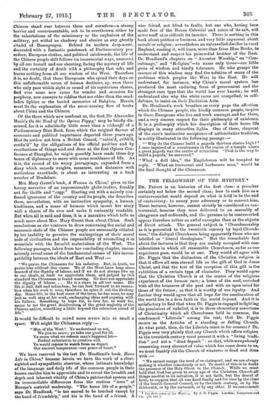THE FELLOWSHIP OF THE MYSTERY.*
Da. Flews is an historian of the first class: a preacher certainly not below the second class ; how to rank him as a controversialist would depend on what is held to be the end of controversy : to annoy your adversary or to convert him. These lectures, however, cannot strictly be considered as con- troversial, because they were delivered to an assembly of clergymen and ordinanda, and the persons to be controverted appear therefore rather as awful examples than as the objects of direct attack. The general subject ie " Churchmanship as it is presented to the twentieth century by loyal Church- men," the disloyal Churchmen being apparently those who are
labelled as "liberal theologians." But the remarkable fact about the lectures is that they are mainly occupied with con-
siderations in which all reasonable Churchmen, so far as our experience goes, would be at one. They would all agree with Dr. Figgie that the distinction of the Christian religion is that it offers all men eternal life as the gift of God in Jesus Christ, and that the test of the reception of this gift is the exhibition of a certain type of character. They would agree that the Christian Church is at the centre of the religious experience of the human race; a home of the soul, enriched with all the treasures of the past and with an open mind for those of the future; so that it is worthy of our loyalty. And further they would agree that all hope for the amelioration of the world lies in a firm faith in the world beyond. And it is satisfactory to find that when Dr. Figgie is eugaged infighting the pessimism of unbelief, it is to these elementary assertions of Christianity which all Churchmen hold in common, the condemned "Liberals" among the rest, that Dr. Figgis recurs as the Articles of a standing or falling Church. At what point, then, do the Liberals come in for censure ? Figgie sees very plainly that any Church which offers religion to the twentieth century must present it with a "living tradi- tion" and not a "dead deposit": ao that, while scrupulously conserving every element of value which has come down to us, we must frankly rid the Church of whatever is dead and done with:— "We cannot escape the need of re-statement, and we aro always making it whether consciously or not. To doubt of this is to doubt the presence of the Holy Ghost in the Church. While we must hold that God has given to every age of the Christian Church all things needful to its salvation, it is not faith, but the denial of faith, to suppose that all was fixed finally and for over by the close of the fourth General Council, or by the sixth century, or by the thirteenth, or by the sixteenth, or by any other. It we can commit • TS, Pclinoysip ef rte Myst..y. lly J. N. Magi. Landau: Longman* sod Ca. Oa net]
blasphemy against the Holy Ghost, surely we shall be doing something very like it if we deny that He is speaking through God's Church in the twentieth century."
Again
" While holding fast to the 'Eternal Gospel,' there is before us in this age the task, not yet accomplished, of adjusting to a theology flamed in another intellectual climate, a new view of the Bible, enlarged conceptions of history, and deeper knowledge of the natural world and of the mind of man. ' Mediating liberalism' is perhaps the best term in which to describe the attitude of wisdom; for that implies a real reverence for the heritage that is ours, together with en alert openness to what is new. Do not let us suppose there is no problem, or deny changes which are real."
Thus Dr. Figgie pleads for a " mediating liberalism" in general terms. But if the reader expects to find any particular instance of the open mind to what is new, if he looks for any single article in any creed which Dr. Figgie would allow to be restated, he will be disappointed. Even the warning clauses of the Quiet/ague milt, which, in the judgment of nine lay Churchmen out of ten, represent the "dead hand" in its deadliest form, are to be accepted with loyalty.
The explanation of this acceptance in theory and refusal in practice of "mediating liberalism" ie given in an appendix of much personal interest, if little argumentative value. Dr. Figgie there explains that, when he was at Cambridge, he "lived however humbly in the academic world"; and his experience of "academic critics debating the religious pro- blem on college bowling-greens" was that they lacked some of the necessary qualities of religious insight. lie therefore distrusts the critics on account of their supposed " presup- 'positions." We think Dr. Figgie might have found a critic et Oxford, if not at Cambridge, with no "assumption of intel- lectual superiority," and with the "deepest reverence for the religious experience of Christendom." But the fact is a man must himself be something of a critic if he is to appreciate criticism; and Dr. Figgie's respectful reference to the views of Professor A. C. Clark on the concluding verses of St. Mark is sufficient to show that criticism means nothing to him at all.



































 Previous page
Previous page